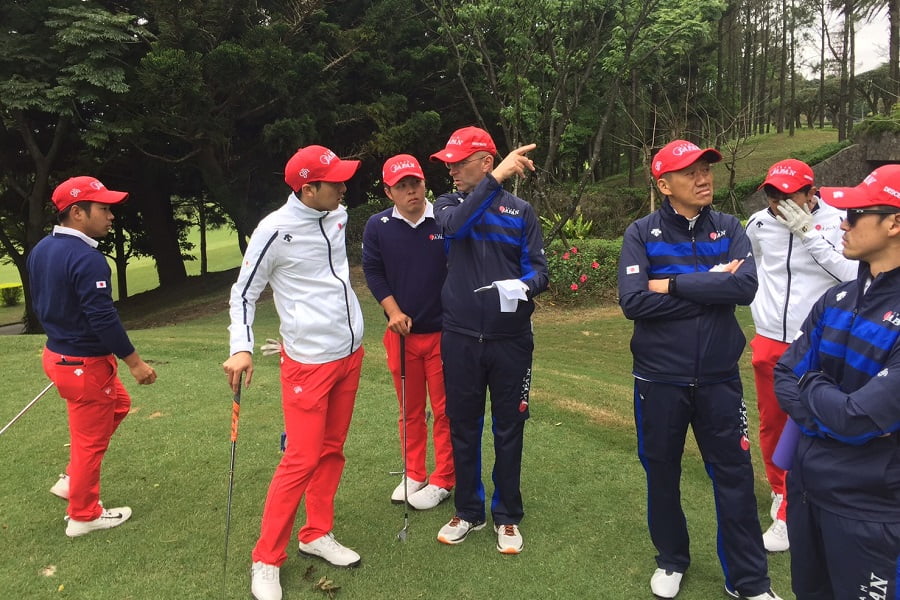Source: The Professional, Jan-Mar 2019
A South Australian PGA Professional who learnt the game in England, Gareth Jones is awakening the sleeping giant that is elite-level golf in Japan.
One of Ross Herbert’s earliest lessons is helping Gareth Jones to change the face of golf in Japan.
When the legendary head of the Australian Institute of Sport golf program invited Jones to join him in Melbourne in 2000, Jones was quickly exposed to Herbert’s methodology that golfers had to be treated as athletes.
Herbert’s untimely passing a year later at just 41 years of age meant that his time with Jones was short but his impact profound.
As coach of the Japan national team for the past four years, Jones has applied the teachings of Herbert and instituted a nationwide coaching framework that is elevating Japan’s elite amateurs onto the world stage. “I’d seen Ross present when I was a trainee pro in Adelaide. He was coaching at the very highest level in Australia at that time and someone I thought I could really learn from,” Jones says. “At the end of 1998 the AIS advertised for a scholarship coach to work underneath Ross. “He gave me an opportunity so I moved over to Melbourne for $25,000 a year and I learned so much, especially in that first year. “He had very, very high standards as a professional and those sorts of things stuck with me. He was the ultimate coach. He cared about his players massively which hopefully I do as well.
“Ross and his wife Donna were pseudo parents to me when I moved over there. They really looked after me.
“I don’t know why he gave me the opportunity but I’m forever grateful that he did and allowed me to work in elite golf here in Australia.
“After Ross passed away I stayed on under Mark Holland and that really set a lot of the patterns for my coaching.”
In conjunction with another highly influential figure taken from Australian golf far too young, Ramsay McMaster, Herbert established a program that focused on golfers as athletes, a concept that Jones says is still to gain widespread traction in Japan.
“Because he worked so closely with Ramsay McMaster, Ross’s big thing is that we have to treat the golfers as athletes. And the golfers have to think of themselves as athletes,” Jones says.
“I’d been watching from a small distance the Japan men’s and women’s teams in Asia Pacific tournaments and they always looked fantastic. The first impression when you see the Japan team is how smart they look, uniforms are immaculate and they have great discipline in the way they present themselves but they weren’t producing enough scores.
“They weren’t really engaging sports science all that well in the national team and throughout the regions that’s something we’re trying very hard to develop, integrating sports science into coaching. It’s been quite old-school.
“Because I’m heading the program now and I have a little bit of a say in what happens we’ve been able to bring in a strength and conditioning program into the full-time curriculum.
“Something that they never used to do was train during tournaments but now we train during tournaments. Very simple stuff that Australian players maybe take for granted.
“What I’m presenting to the players is nothing new but they’re doing it at a really good level and they’re committing to it and practicing hard.”
Results rising in Japan
The results posted by Japanese amateurs in recent years speak for themselves.
During the Australian Open both Keita Nakajima and Takumi Kanaya featured prominently on the leaderboard before finishing tied for fifth and tied for 17th respectively.
Nakajima earned his place in the field courtesy of his win earlier in the year at the Australian Amateur, he and Suzuka Yamaguchi completing a historic men’s and women’s Aussie Amateur double, the first Japanese players to claim our top amateur crowns.
Nasa Hataoka finished fifth on the money list in just her second year on the LPGA Tour in the United States and Jones says there is a definite focus on transitioning Japan’s best young players into world players.
“We have a high priority on the players wanting to play overseas,” Jones explains.
“The Team Japan program has changed. We’re not satisfied just playing the domestic tour. “We do get some funding from the Japanese Olympic Committee so the Olympics are a really important part of our high performance program and to be successful at the Olympics the players have to be playing at the highest level.
“We’re constantly talking about an international growth mindset approach. The comparisons that we make with the players are always world’s best and the world’s best are in America and Europe.
“Those two boys, their vision is totally about going to the US or Europe in the future.
“The girls tend to turn professional straight out of high school and the main reason for that is the Japan LPGA Tour is so strong financially. It’s almost a no brainer for them and their families.
“A lot of girls will play two years in Japan and if they can play well enough they can break into the top-75 in the Rolex Rankings and go straight to Final Stage Q-School for the LPGA Tour in the US. “That way they go to America with a slightly stronger resume and hopefully with the experience of having won in Japan.”
A journey of discovery
Born in England, Gareth Jones moved out to Australia with his family at a young age before returning to the mother country just prior to his teenage years.
Amongst the many discoveries that happen at such an age, Jones fell in love with golf.
Living in the golf-rich region of Blackpool within reach of famed Royal Lytham and St Annes – “but certainly not at Royal Lytham” – Jones learnt the game under some influential PGA Professionals before the Jones family returned to Australia and established a new life in Adelaide.
“I was coached by some great PGA pros that I looked up to when I was a junior and I’m still in touch with my first coach from those days in England,” Jones recalls.
“Back in those days the Greg Normans, the Seve Ballesteros’ were my idols and that’s when I really decided that I wanted to be a golf pro.
“We moved back out to Australia when I was 16 and then worked towards becoming a PGA of Australia Professional by starting a Traineeship at Kooyonga. After three years I went back to my home track at Tea Tree Gully.
“I wanted to be a Tour player and tried to play for a few years and then found out that I was rubbish. I could see my bank balance going south very rapidly so decided I needed to do something else and the other thing I really enjoyed was teaching.
“I started teaching at a driving range here in Adelaide called Starline Driving Range, which is now The Range at O’Halloran Hill. I did that for a year and then went across to the AIS.”
After five years at the AIS Jones joined fellow PGA Professional Sandy Jamieson in a coaching initiative based at Patterson River Golf Club south of Melbourne before returning to Adelaide where he became Golf Australia’s National Coach for South Australia.
Based at Glenelg Golf Club, the association with Golf Australia’s national program provided Jones with the opportunity to work with elite amateur teams where he saw at close hand the need for change within the Japan system.
“Japan have always had a national team and it’s always been a great source of pride for the players to be involved but they didn’t have a coach,” says Jones.
“They didn’t have a national coach that could set the curriculum and the pathway for those aspiring to play for the national team.
“The World Amateur was played in Japan in 2014 and our Australian girls won it, the boys finished sixth but it was a very disappointing tournament for both Japan’s men’s and women’s teams.
“That gave the Japan Golf Association an opportunity to start trying to do something different.
“They’d been watching the success we were having and perhaps what we were doing in the program sense.
“Japan were really keen to get an Australian coach, they talked to Brad James and Matt Cutler at Golf Australia and asked whether they could approach me to come and help them.”
In addition to making a mean sushi roll for his wife of 16 years Cathy and their two children, Max and Lucy, Jones believes there is something that Australian golf can now learn from the way the system is structured in Japan.
“The main difference is that in Japan now there is one coach setting a curriculum for the whole country to follow and that has been successful so far in that there is a clear direction for everybody,” Jones explains.
“It doesn’t matter which region they come from, they’re getting exposure to the same information.
“Whether or not that’s the right information is obviously determined by results over time. If it is I’ll keep my job and if it’s not then I’ll lose my job, and that’s probably the way it should be.
“If you come from Adelaide or Hobart are you getting exposure to the same resources to those who live in Sydney, Brisbane or Melbourne? Hopefully you do but sometimes we might not get the same level of help in those slightly more regional cities.
“We’ve always got to make sure that wherever a kid is from that they are getting exposed to the absolute best information they can be.
“It should improve under the OneGolf structure as long as we can get all the states on board.”





